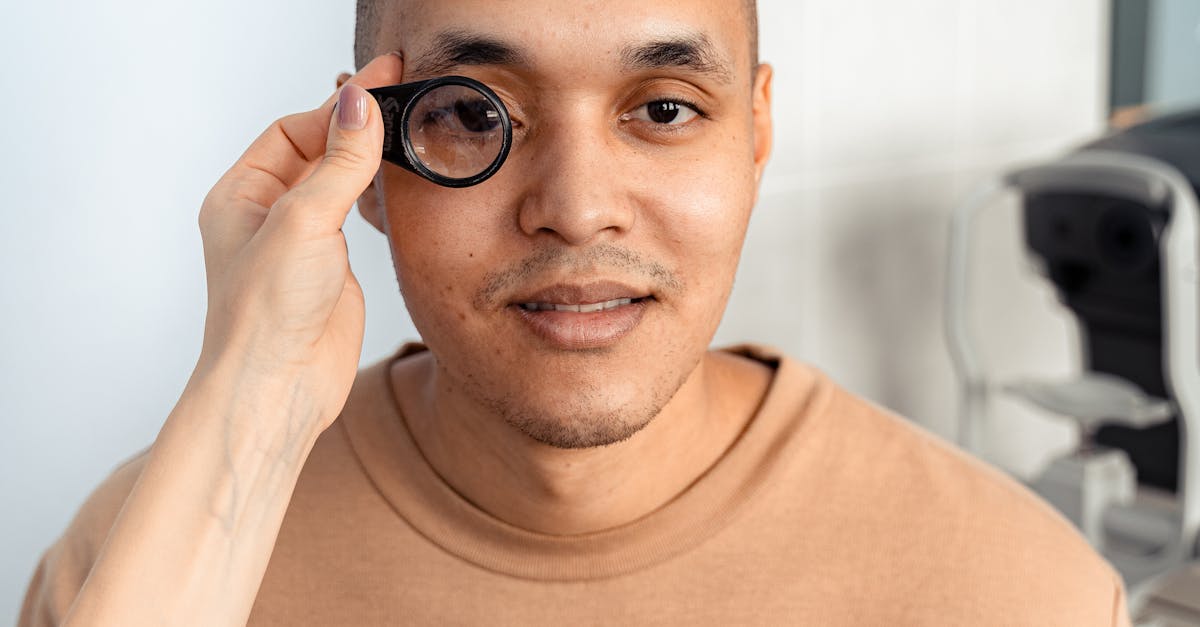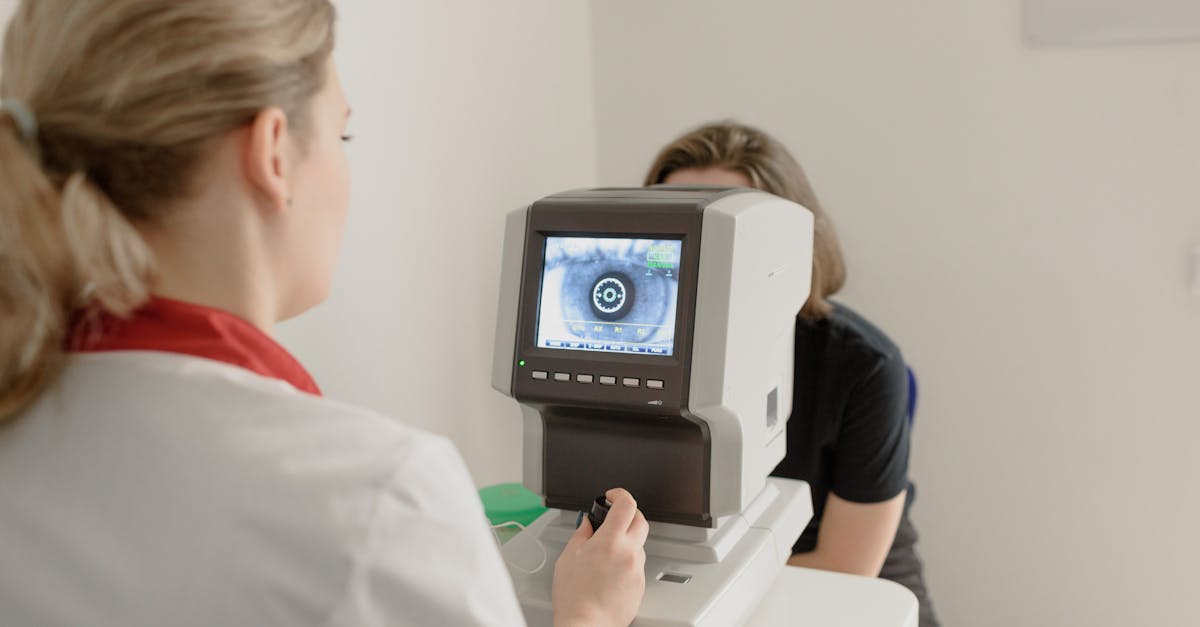If you’ve noticed that driving down North Avenue after sunset has become more challenging, or that you’re fumbling around your own Glendale Heights home in dim light, you might be dealing with night blindness. It’s a common concern we hear at iDoctor, and getting to the root of the problem is the first step toward seeing clearly and confidently again.
It’s a common misconception that night blindness, also called nyctalopia, means you can’t see at all in the dark. In reality, it’s more of a noticeable struggle to see clearly in any low-light environment. This difficulty is almost always tied to a problem with your retina’s rod cells—the tiny photoreceptors in charge of your vision when the lights go down.
Why Is It Suddenly Harder to See at Night?
When you suddenly find it harder to see after dark, it’s completely natural to feel a bit concerned. For many people, worsening night vision isn’t just a minor annoyance; it can seriously knock your confidence, especially when it comes to driving at night or even just walking through your house. Getting to the bottom of what’s causing your night blindness is the first and most important step toward finding a real solution.
The reasons behind poor night vision are surprisingly diverse. They can range from simple nutritional gaps that are easy to fix, all the way to more complex, underlying eye conditions that need ongoing care. Some causes are very treatable, while others require careful management to protect the vision you have.
The Most Common Culprits
Most of the time, the root of the problem can be traced back to one of four main areas: an underlying eye disease, a nutritional deficiency, a genetic condition, or even a side effect from medication. Pinpointing which one is affecting you is the key to getting the right kind of help.
Here’s a quick breakdown of what could be going on.
1. Nutritional Deficiencies
Your eyes rely on specific vitamins and minerals to function properly, especially when adapting to darkness. A Vitamin A deficiency is a classic, well-known cause of night blindness. This vitamin is essential for producing rhodopsin, the pigment your rod cells need to detect light. Without enough of it, your eyes simply can’t gather the light they need to see in the dark.
2. Genetic Conditions
Sometimes, the issue is hereditary. Inherited conditions like retinitis pigmentosa involve a slow, progressive breakdown of the light-sensing cells in the retina. Often, one of the very first signs people notice is increasing difficulty with night vision, years before other symptoms appear. Another genetic condition, Usher syndrome, can also cause nyctalopia along with hearing loss.
3. Ocular Diseases
Several common eye diseases directly interfere with your ability to see in low light.
- Cataracts: This is probably one of the most frequent culprits. A cataract clouds the natural lens of your eye, which scatters incoming light instead of focusing it cleanly onto your retina. The glare from headlights can feel blinding, and vision in dim settings becomes hazy and indistinct.
- Glaucoma: This condition damages the optic nerve, which transmits visual information from your eye to your brain. While it’s often associated with peripheral vision loss, advanced glaucoma can also significantly impair your ability to adapt to changing light levels.
- Diabetic Retinopathy: For individuals with diabetes, damage to the blood vessels in the retina can lead to a host of vision problems, including poor night vision.
4. Medication Side-Effects
Believe it or not, certain prescription medications can also contribute to night blindness. Some drugs used to treat glaucoma, for example, work by constricting your pupils. Smaller pupils mean less light can enter the eye, making it much harder to see in dark environments.
This visual guide helps connect the dots between the different causes and the shared symptom of poor night vision.
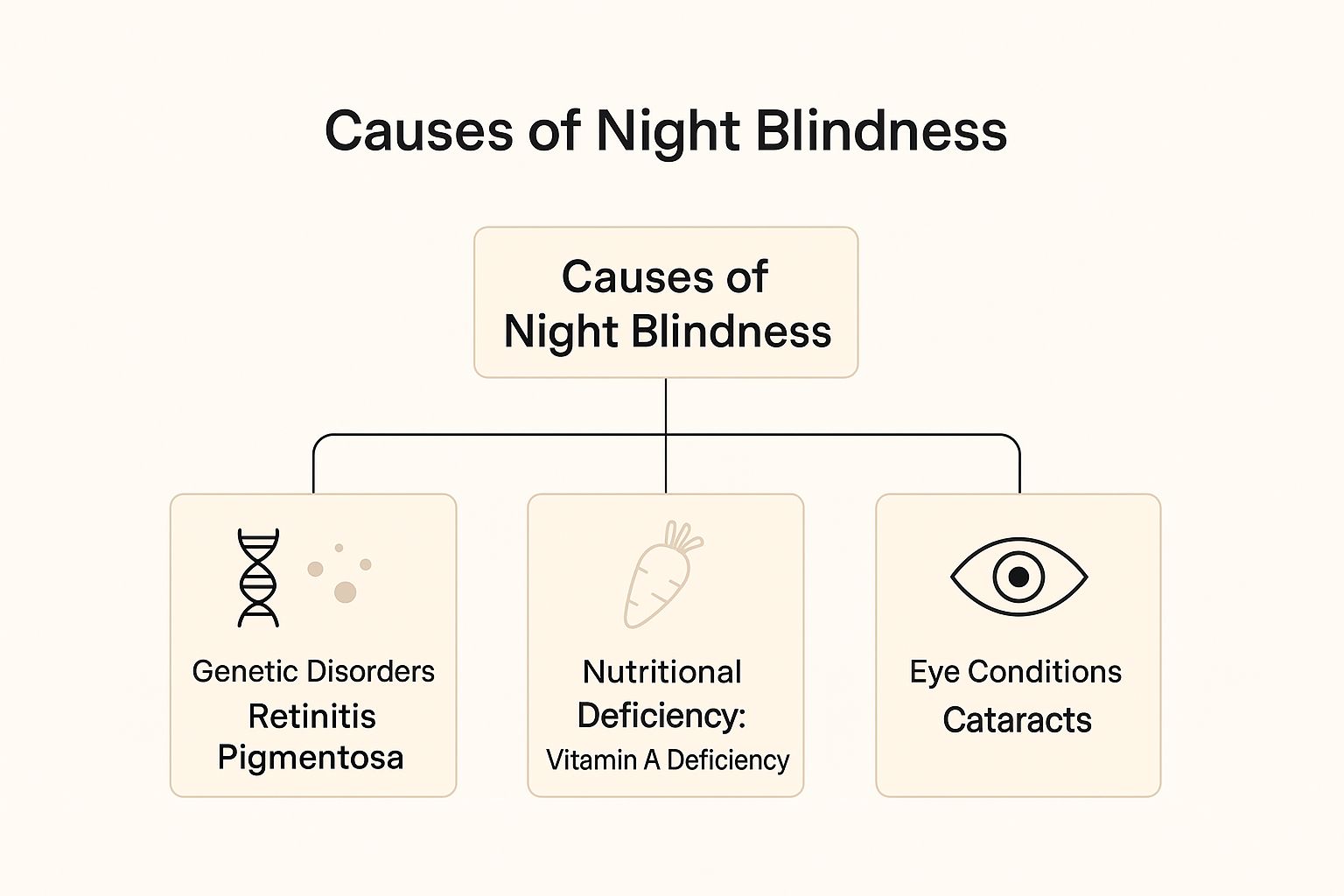
As you can see, the path to impaired night vision can start from very different places—genetics, diet, or a physical change in your eye. But they all lead to the same frustrating result.
To help you keep track of these varied causes, here is a simple table summarizing the most common factors.
Common Causes of Night Blindness at a Glance
| Category | Specific Cause | Is it Treatable? |
|---|---|---|
| Nutritional | Vitamin A Deficiency | Yes, often reversible with diet changes or supplements. |
| Ocular Disease | Cataracts | Yes, with cataract surgery. |
| Ocular Disease | Glaucoma | Manageable with treatment, but vision loss cannot be reversed. |
| Ocular Disease | Diabetic Retinopathy | Manageable with blood sugar control and medical treatments. |
| Genetic | Retinitis Pigmentosa | Not currently curable, but vision aids and management can help. |
| Medication | Side-effects from certain drugs | Sometimes, by adjusting or changing the medication. |
Ultimately, the only way to know for sure what’s causing your symptoms is to get a professional evaluation. A detailed eye exams in Glendale Heights will help identify the exact cause and determine the best course of action for you.
How Your Eyes Adjust to the Dark
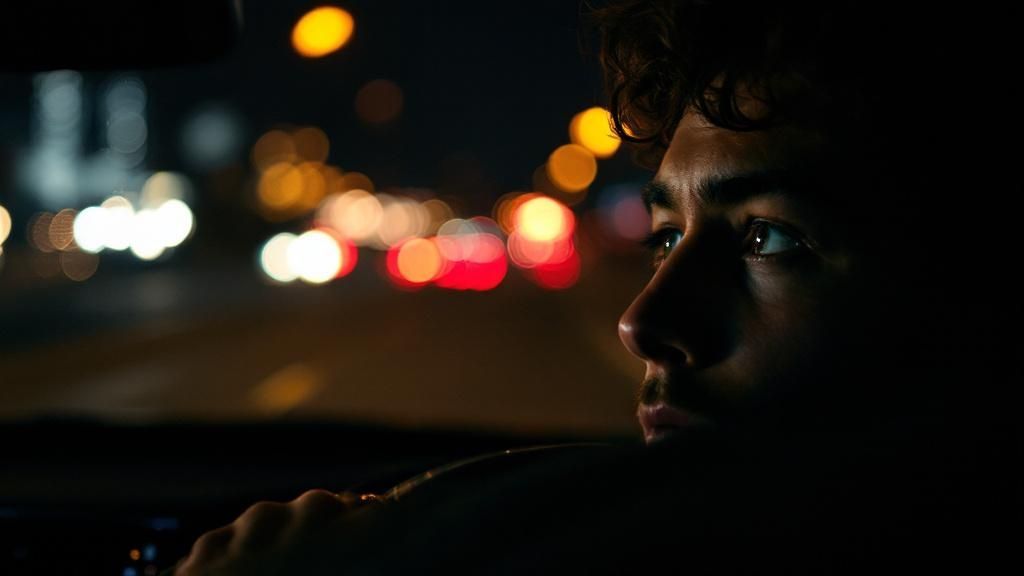
Before we can get into what causes night blindness, it helps to first appreciate how healthy eyes manage to see in the dark. It’s a pretty amazing biological process. Think of your eye like a high-tech camera that instinctively knows how to switch to a low-light mode. This all happens in the retina, a thin layer of tissue lining the back of your eye.
Your retina is packed with millions of tiny, light-sensing cells called photoreceptors. They come in two distinct types: rods and cones.
- Cone Cells: These are your daytime pros. They handle bright light, giving you sharp, detailed vision and the ability to see a full spectrum of color.
- Rod Cells: These are the real heroes of night vision. Rods are incredibly sensitive and can detect even the faintest light, but they don’t process color. This is why a moonlit landscape looks like a black-and-white photo.
When you go from a bright space to a dark one, your eyes kick off a process called dark adaptation. This is the key to being able to see at night.
The Magic of Dark Adaptation
Picture this: you step out of a brightly lit store and into the dim evening light of a parking lot. For a few seconds, you can barely see a thing. That’s because your cone cells, which were working overtime in the store, are pretty much useless in the dark.
This is where your rod cells step up. They begin to take over the heavy lifting, but they need a moment to get going. This transition, which can take anywhere from a few minutes up to half an hour, is dark adaptation. During this time, your rods start generating a crucial, light-sensitive pigment.
This pigment is called rhodopsin. You can think of rhodopsin as the special fuel your rod cells need to catch even the smallest particles of light. Without enough of it, your ability to see in low light plummets.
The production of rhodopsin is a chemical reaction that absolutely depends on Vitamin A. This link is one of the most important things to understand about night blindness. If your body is low on Vitamin A, your rod cells simply can’t make the rhodopsin they need to function properly.
This switch from cone-based vision to rod-based vision is what allows you to eventually make your way through a dark room or drive safely after sunset. Anything that harms your rod cells or gets in the way of rhodopsin production will sabotage this entire process, leading directly to the frustrating symptoms of night blindness. Keeping this in mind makes it much clearer why things like cataracts or nutritional deficiencies, which we’ll discuss next, specifically impact your vision when you’re navigating Glendale Heights at night.
The Link Between Nutrition and Night Vision
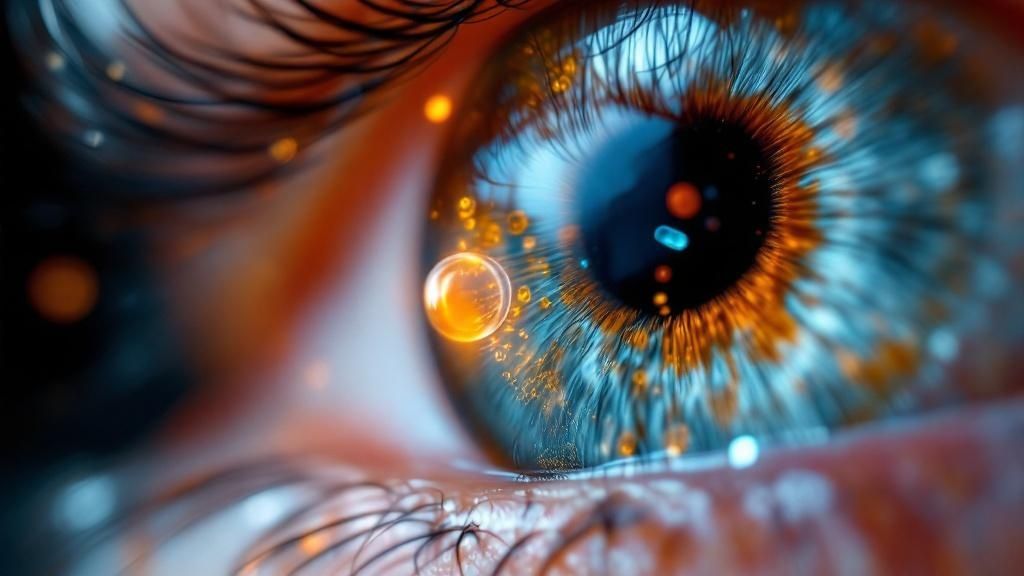
When people ask me what causes night blindness, one of the first places we look is diet. There’s a very real connection between the foods you eat and your ability to see after sunset, and it all boils down to two superstar nutrients: Vitamin A and zinc.
Vitamin A is the absolute foundation of good night vision. Your body uses it as the primary raw material to create a pigment called rhodopsin, which is what allows the rod cells in your retina to detect light. Without enough Vitamin A, you can’t produce enough rhodopsin. It’s like trying to start a fire with damp wood—you just won’t get the spark you need to see in the dark.
While a severe Vitamin A deficiency is uncommon here around Glendale Heights, it’s a massive health crisis on a global scale. In fact, it’s the leading cause of preventable childhood blindness worldwide, and night blindness is one of the earliest red flags. The consequences are heartbreaking, with hundreds of thousands of children losing their sight every year. You can read more about the global impact of this deficiency and its link to food insecurity for a deeper perspective.
How Nutritional Gaps Affect Chicagoland Residents
Even in an area with abundant food choices like ours, certain things can still lead to nutritional gaps that compromise vision. People with medical conditions that hinder nutrient absorption—think Crohn’s or celiac disease—can find themselves at a higher risk. The same goes for anyone following a highly restrictive diet that might unintentionally cut out essential eye-healthy vitamins.
This brings us to Vitamin A’s crucial sidekick: zinc. Zinc is the transport system. It’s responsible for carrying Vitamin A from its storage depot in your liver directly to the retina, where all the magic happens. If you’re short on zinc, that delivery chain breaks down. You could be eating plenty of Vitamin A, but if it can’t get to your eyes, you’ll still struggle with night vision.
Key Insight: Healthy night vision isn’t about one single vitamin. It’s a team effort. A shortage of either Vitamin A or its partner, zinc, can throw a wrench in the works and make it difficult to see clearly in low light.
Foods That Support Your Night Vision
Now for the good news. When night blindness is caused by a nutritional shortfall, it’s often completely reversible through diet. Making sure your plate is full of vision-boosting foods is one of the best proactive steps you can take for your long-term eye health.
Here’s what to look for:
- For Vitamin A: Load up on orange and yellow vegetables like carrots, sweet potatoes, and bell peppers. Dark leafy greens like spinach and kale are also powerhouses.
- For Zinc: Look to lean meats, poultry, beans, nuts, and whole grains to get your daily dose.
Eating these foods gives your eyes the fundamental building blocks they need to perform at their best when the lights go down. If you’re looking for more specific meal ideas, check out our guide on the best foods for your eye health. And of course, if you have any concerns that your diet might be affecting your vision, let’s talk about it during your next eye exam.
Eye Conditions That Impact Night Vision
For many folks here in the Chicagoland area, noticing that your night vision is getting worse isn’t just a random part of getting older—it’s often a clear signal from your eyes that something else is going on. While a poor diet can sometimes be a factor, it’s far more common for the root cause to be an issue within the eye itself.
Catching these problems early is the key. A detailed eye exams in Glendale Heights, complete with our advanced imaging technology, can spot these conditions long before you might notice severe symptoms, giving us a crucial head start in protecting your sight.
Cataracts: The Cloudy Culprit
One of the most frequent reasons people tell me they struggle with night vision is cataracts. The best way to think about it is to imagine your eye’s natural lens is like a perfectly clear camera lens. A cataract is what happens when that lens starts to get cloudy and yellowed over time.
Instead of focusing light cleanly onto your retina, this clouded lens scatters it in all directions. This is why driving at night on roads like Army Trail Boulevard can feel so overwhelming; the glare from oncoming headlights seems to explode into a blinding starburst. In the same way, dimly lit rooms become hazy and indistinct, making it a real challenge to move around safely.
Glaucoma: A Threat to Peripheral and Night Vision
Glaucoma is another serious condition that quietly chips away at your ability to see in low light. This disease causes progressive damage to the optic nerve—the vital cable that transmits everything you see from your eye to your brain.
Most people associate glaucoma with the slow loss of their peripheral (side) vision, and that’s certainly its hallmark. But it also sabotages your eye’s ability to adapt between bright and dark environments. As the condition advances, you might find it harder to spot things at the edges of your vision, coupled with a general, frustrating decline in how well you can see at night. If this is a concern, you can learn more about how we look for this condition in our article on what is glaucoma screening.
Retinitis Pigmentosa: A Genetic Cause
Sometimes, the cause of night blindness is written in our DNA. Retinitis pigmentosa (RP) isn’t a single disease, but rather a group of inherited disorders that lead to the slow breakdown of the light-sensing cells in your retina—the rods and cones. Your rod cells are your night vision specialists, and since they are typically the first to be affected by RP, one of its earliest and most telling signs is major trouble seeing in the dark.
Here in the United States, night blindness is most often tied to age-related eye diseases and genetic conditions, not diet. Cataracts are the leading reversible cause, affecting over 24 million Americans age 40 and older. Another major cause, retinitis pigmentosa (RP), impacts about 1 in every 4,000 Americans, causing progressive loss of night vision. You can explore more about these night blindness statistics and their impact on daily life.
These conditions really highlight why you should never ignore a change in your night vision. It’s often your body’s most direct way of telling you that something deeper needs a closer look.
Other Factors That Can Weaken Your Night Vision

While we often point to major eye diseases or vitamin deficiencies as the culprits behind night blindness, the story doesn’t end there. A handful of other factors, some of which might even surprise you, can make it much harder to see once the sun goes down. Getting a handle on these less obvious causes is key to understanding the full picture of your vision health.
For instance, the problem could be as straightforward as an outdated glasses prescription. If you’re already nearsighted, that slightly blurry distance vision you manage during the day can become intensely frustrating in dim light. Your eyes are already working overtime to focus, which can make something like night driving on local roads feel genuinely hazardous.
Even certain medications can interfere with your night vision. Some prescription drugs, especially certain types of glaucoma drops, work by constricting your pupils. This is great for managing eye pressure, but smaller pupils mean less light can get into the eye, which directly impacts your ability to see clearly in the dark.
Lifestyle Choices and Their Impact
Our daily habits and environment also play a bigger role than most people realize. Think about sun exposure. Years of being out in the sun without proper UV-blocking sunglasses can cause cumulative damage to the sensitive structures inside your eye, including the retina. This long-term exposure can also speed up the development of cataracts, one of the most common reasons for poor night vision.
Key Insight: Night blindness isn’t always a standalone diagnosis. It can be an unexpected side effect of medication, a symptom of uncorrected vision, or the result of long-term lifestyle choices. This really underscores why a comprehensive approach to eye care is so important.
Socioeconomic factors, like access to healthcare and good nutrition, are also part of the conversation. Studies in communities with limited access to fresh, healthy food have revealed a much higher rate of night blindness. One revealing study found a prevalence rate of 3.93%, and of those affected, a staggering 65.6% admitted they didn’t eat enough fruits and vegetables. Many had never even seen a doctor about their symptoms, which shows just how directly our environment can impact our vision. You can explore the full research on these community-specific findings to see the data for yourself.
Finally, all these issues—from uncorrected prescriptions to sun damage—can lead to plain old eye fatigue. If you already spend your days staring at a screen, you might find your eyes feel particularly strained and tired by the evening, making dim conditions even more challenging. Our guide on digital eye strain treatment has some great tips for this. By looking at the full spectrum of causes, you and your optometrist can put together a plan that keeps your vision sharp, no matter the time of day.
When to Schedule an Eye Exam in Glendale Heights
If you’ve noticed a change in your night vision, even a subtle one, that’s your cue to see a professional. For anyone living in Glendale Heights, Bloomingdale, or Carol Stream, it’s a symptom that shouldn’t be brushed aside. Simply ignoring what causes night blindness won’t fix the problem; it just puts off finding a solution.
Think about it. Has driving after sunset become a white-knuckle experience? Do you find yourself squinting to recognize faces in a dimly lit restaurant? Or maybe your eyes just take forever to adjust when you walk into a dark room. These aren’t just minor inconveniences—they are important signals from your body about your eye health.
Getting to the Root of the Problem
At iDoctor, our 30-minute detailed eye exams go far beyond just checking your prescription. We use advanced, high-resolution imaging to get a crystal-clear picture of what’s happening on the inside of your eye. This technology lets us pinpoint the exact cause of your vision struggles, and a prompt diagnosis is always the most important factor in protecting your sight.
Your vision is far too precious to leave to chance. Whether the answer is a new pair of glasses, managing early-stage cataracts, or tackling a more complex condition, getting an accurate diagnosis is the first and most critical step.
We firmly believe that top-tier eye care should be within everyone’s reach. That’s why we’re proud to accept all major vision insurance plans, making it easier for our neighbors to get the care they need without worrying about the cost. If you have questions about how often you should be seen, our guide on how often you should get an eye exam is a great resource.
Don’t let poor night vision limit your life or put your safety at risk on local roads like North Avenue or Army Trail Boulevard. Let the best optometrist in Glendale Heights help you find the clarity and confidence you deserve, day and night.
FAQ: Your Questions About Night Vision in Glendale Heights
We hear a lot of the same questions from our patients in Glendale Heights about trouble seeing at night. Let’s clear up a few of the most common ones.
Is it normal to struggle with headlight glare on local roads?
Struggling with glare, halos, or starbursts around headlights when driving on roads like North Avenue is a classic sign of nyctalopia. It’s not just an annoyance; it often points to developing cataracts or uncorrected astigmatism. Our detailed eye exams in Glendale Heights can determine the exact cause so we can find the right solution, which may include new glasses with an anti-reflective coating.
Can my night blindness be fixed?
The answer depends entirely on the root cause. If it’s caused by a Vitamin A deficiency or an outdated prescription, the solution can be straightforward. If cataracts are the issue, cataract surgery is highly effective. For other conditions, we focus on management to preserve your vision. The only way to know for sure is to start with a comprehensive exam.
Do you offer designer eyeglasses that can help with night driving?
Yes! If your night vision issues are related to an uncorrected refractive error, a new pair of glasses is often the solution. We offer a curated collection of designer eyeglasses in Glendale Heights, including luxury brands like Cartier and Gucci, as well as affordable options like Ray-Ban. We can fit your new frames with lenses that have anti-reflective coatings, which are excellent for reducing glare from headlights and improving comfort during night driving.
Ready to feel confident behind the wheel at night again? The expert team at iDoctor is here to help you get to the bottom of your vision changes. Schedule your detailed eye exam in Glendale Heights today and let’s find the right solution for you. Book your appointment at https://idoctoril.com.


